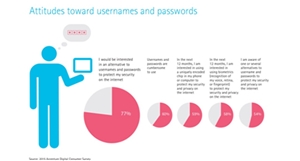Most consumers open to password alternatives to protect their security on the Internet, Accenture Research Reveals
According to Accenture’s latest report titled ‘Digital Trust in the IoT Era’ most consumers consider usernames and passwords cumbersome and are interested in using alternatives to them to protect their security on the Internet. The report is based on a survey conducted online of 24,000 consumers across six continents.
The survey also found that 46 percent of consumers globally are confident in the security of their personal data. Consumers in emerging countries were slightly more confident in the security of their personal data than were those in emerging countries, at 50 percent and 42 percent, respectively.
The research reveals that openness to alternatives is pervasive in countries in many different parts of the world, with consumers in China and India most likely to be open to alternatives, at 92 percent and 84 percent, respectively. 78 percent of consumers in each of Brazil, Mexico and Sweden, and 74 percent in the United States are also willing to consider security methods other than usernames and passwords.
“The widespread practice of typing usernames and passwords to log on to the Internet might soon become obsolete,” said Robin Murdoch, managing director of Accenture’s Internet and Social business segment. “Traditional one-step passwords are now being matched with alternative methods using biometric technologies such as fingerprint recognition and two-step device verification. Within the next few years we are likely to see many more consumers embracing these and other alternative methods.”
“Digital trust concerns are not limited to one type of country or part of the world. In developed and emerging countries, consumer wariness about data privacy and digital trust is intensifying as the exploding Internet of Things market generates unprecedented amounts of consumer data on more devices. Companies that build the most trust with consumers will be able to access more consumer data, use analytics to unlock more value from that data, and offer more revenue-generating services and applications leveraging Internet of Things opportunities,” Murdoch added.




